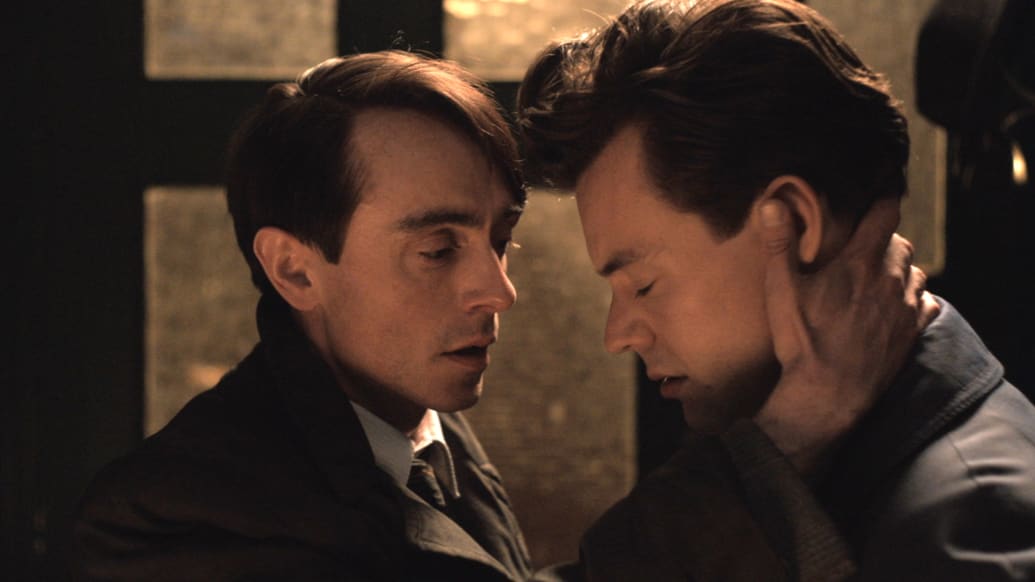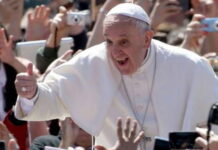A hesitant hush fell over the Cinépolis theater in Chelsea a few weeks ago, during the first of the sex scenes in My Policeman. Michael Grandage’s new film, which hit theaters over the weekend and lands on Prime November 4, is the story of two men from different social circles in late-1950s England, who fall into a forbidden love after a chance meeting in the streets of Brighton.
Much has already been said about the way intimacy is performed in the film, most notably—and controversially—from its megawatt star, Harry Styles. “So much of gay sex in films is two guys going at it,” Styles told Rolling Stone in August. “And it kind of removes the tenderness from it.”
It took about five minutes for Styles’ quote to set the internet ablaze. “Pretty much the entirety of queer cinema is about sensuality and coded references,” one Twitter user said. “‘Two guys going at it is pretty much only a description of porn.” Several other people speculated that Styles had never actually seen any queer cinema.
Styles’ comment was ignorant and boneheaded; there’s no way around that. Most gay cinema—especially the stuff aimed at mainstream (i.e. straight) audiences—is largely sanitized from the realities of gay sex. If anything, filmmakers often resort to light tenderness and implication when it comes to gay sex scenes, as opposed to showing their characters in an animalistic state of fuck. The most “raunchy” scenes in heralded, awards-bait gay films like Brokeback Mountain or Milk either remove a decent amount of pleasure from the sex to make it more emotionally weighty, or film it briefly, through a crack in a door, before cutting to black.
Typically, gay sex scenes that actually depict gay characters “going at it” are reserved for queer cinema made by and for queer people—which is to say these are often very small independent films that don’t reach a wide audience. And even in those films, it’s hard to single out a scene of salaciousness that isn’t also paired with one of affectionate passion somewhere else within the movie’s runtime. I’d quite simply like to see Styles state his sources in a comprehensive list.
When my screening of My Policeman began, you could hear a pin drop. My stomach chose the wrong moment to growl and I almost felt it necessary to issue a notes app apology. It was as if myself and the scattered other members of the press at the screening were all waiting to see if Styles and his costar, David Dawson, could make good on their promise.
Much to my surprise, that first scene—along with each sex scene that follows it—is performed with appropriate tenderness and realistic lust, creating a palpable, undeniable sensuality that left me hot under the collar. By god, Harry Styles was right.
In the film, Styles plays the titular policeman (which is as humorous of a title to write as it is to hear in the film), Tom, who meets the established and well-dressed museum curator, Patrick (Dawson), in a chance run-in. Patrick is immediately taken with Tom’s unassuming, gentle nature, and invites him to the museum as his guest. Patrick is surprised when Tom takes him up on the offer, and the two begin to connect on a deeper level over the beauty of the paintings Patrick presides over.
From their first meeting, Styles and Dawson have terrific chemistry. There’s a pleasant, natural ease between the two men, so when Patrick invites Tom to his apartment to sketch him, Tom agrees as a friend but wears a look of acknowledgement to match Patrick’s coy smile.
When Tom arrives at Patrick’s apartment, the air in the room is already heavier. They are in a private setting, behind closed doors and away from prying eyes. Despite their clear attraction, neither can make the first movie—certainly not Patrick, who would not only be beaten, but arrested if his feelings were unreciprocated. When Patrick asks Tom to change into his police uniform for the portrait, the two exchange a breathless hesitation. Even the idea of Tom stripping down solo in another room with Patrick nearby is intoxicating.
Sitting for the portrait, Tom speaks of his pride in being a policeman, fulfilling a lifelong goal of wanting to do good. Patrick then mentions that he’s rattled by the presence of law enforcement. Patrick’s admission is a test of sorts, a nod to the greater truth of his fundamental identity. And while Tom is initially upset by Patrick’s dismissal of his profession, he stays for a drink anyway—giving Patrick his answer.
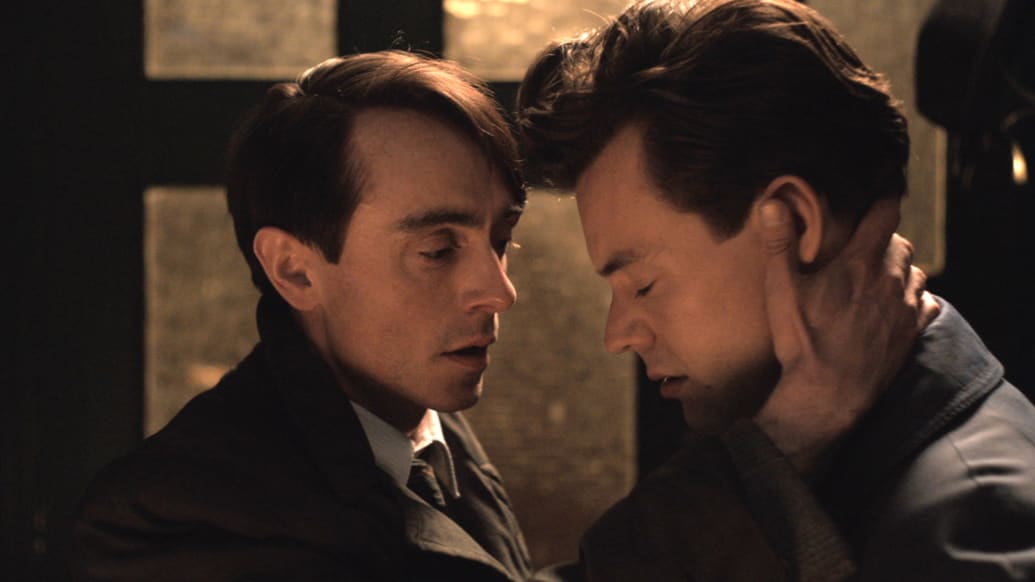
Amazon Studios
The two men share scotch and conversation on the couch for hours, before a lull in the music and the haze of the alcohol takes over. Tom compliments Patrick and stretches his arm across the space between them on the sofa, letting his hand fall on Patrick’s shoulder while his fingers gently caress his neck. Patrick silently weighs the risk of this moment and decides to take the plunge, leaning his head into Tom’s hand before starting to kiss his fingers.
Before long, they’ve both thrown caution to the wind, and Patrick removes Tom’s uniform to perform oral sex while he sits on the couch. The act takes place out of frame, but the real intimacy is established in those moments just before. Tight camera shots of Styles’ lips and hands underscore Patrick’s silent longing before the two ever touch; it’s stunning to watch, properly reflecting what it’s like to lust over someone of the same gender in silence before obtaining security in reciprocity.
As Tom gathers his things to leave in the soft light of dawn, he looks solemnly at Patrick and asks him, simply, “How do you do it?” Tom is controlled by his repression and guided by the set social standards that have led him to a fiancée, Marion (Emma Corrin). But despite his social rigidity, he lacks self-control. And Patrick has unlocked a long-buried temptation inside of him that he could never admit to.
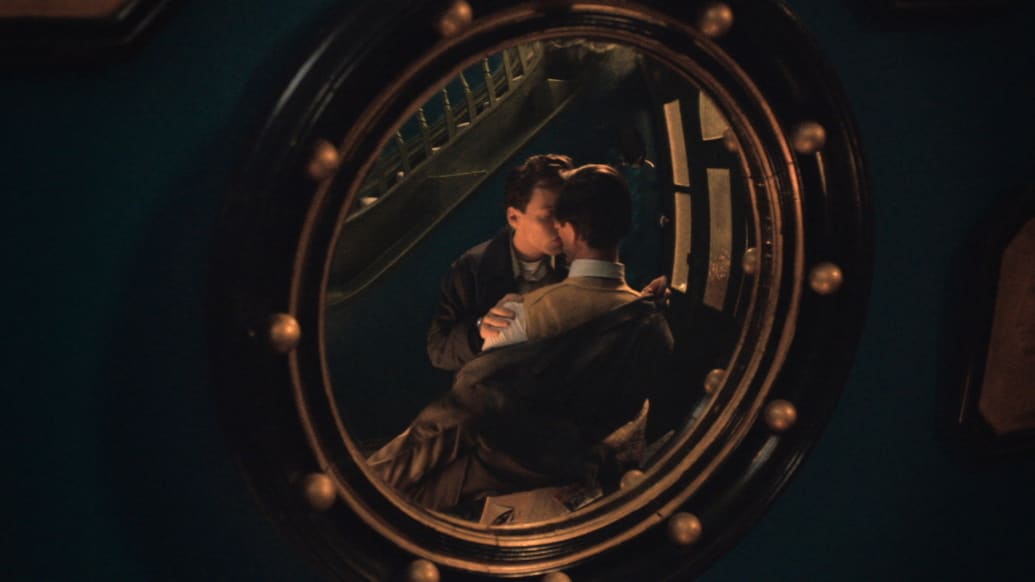
Amazon Studios
Much has already been said about Harry Styles as an actor, and very little of it is good. But to his credit, Styles’ amateur abilities lend to his performance of Tom’s timidity. I was taken by how well Styles is able to convey Tom’s conflicted yearning; he’s much more charming and believable in softer moments of introspection and subtle connection than he is in more dramatic scenes that require a larger presence of character.
When Tom shows up drunk one night at Patrick’s flat, the two engage in a deeply passionate, very steamy sex scene. All the nudity, save for four bare ass cheeks, is hidden by the scene’s staging, but it cleverly maintains the impression of reality. Gay sex in films is often perceived by straight audiences as lewd fucking and not “love-making”—which is how it’s often depicted in stories of heterosexual romance. But in their second love scene, Styles and Dawson evoke a sense of both.
“Patrick and Tom hold each other close, making love to each other while clearly enjoying the carnal nature of their desire.”
Patrick and Tom hold each other close, making love to each other while clearly enjoying the carnal nature of their desire. The scene is designed to show that the sex between these two characters is both erotic and romantic, while also realistic. Tom and Patrick engage in anal sex. The scene is not staged for the audience’s pleasure. There are no legs flailing in the air or instinctively arched backs; this is a time before porn made it so gay men adjusted their own pursuit of pleasure to what they’ve seen in “adult” films that are specifically meant to titillate others.
Styles had a lot to prove in My Policeman. Not just because of his own ridiculous perspective on queer cinema—which, I’ll give him the benefit of the doubt, could’ve been misconstrued—but because he already faced to much criticism in the face of Olivia Wilde’s endless commentating on Don’t Worry Darling’s useless and inexplicable sex scenes. But unlike that film, in which the extent of Styles’ intimacy work was putting his head under a skirt, My Policeman proves he is capable of translating the heartthrob charisma that has made millions of fans swoon in arenas around the world to the silver screen, too.
In My Policeman, the more experienced gay character guides the other, encouraging him to feel out what feels naturally pleasurable to him. It’s a realistic depiction of gay sex, when one participant is more proficient than the other. It’s also a notable portrayal of how good, fiery sex can fill in some of the cognitive gaps between sex and love—sometimes to our detriment.
When Tom accompanies Patrick on a work trip to Venice, they are finally able to be alone together in a place where no one knows them. They’re able to see how their dynamic works outside of the bedroom, and if their chemistry is solely sexual.
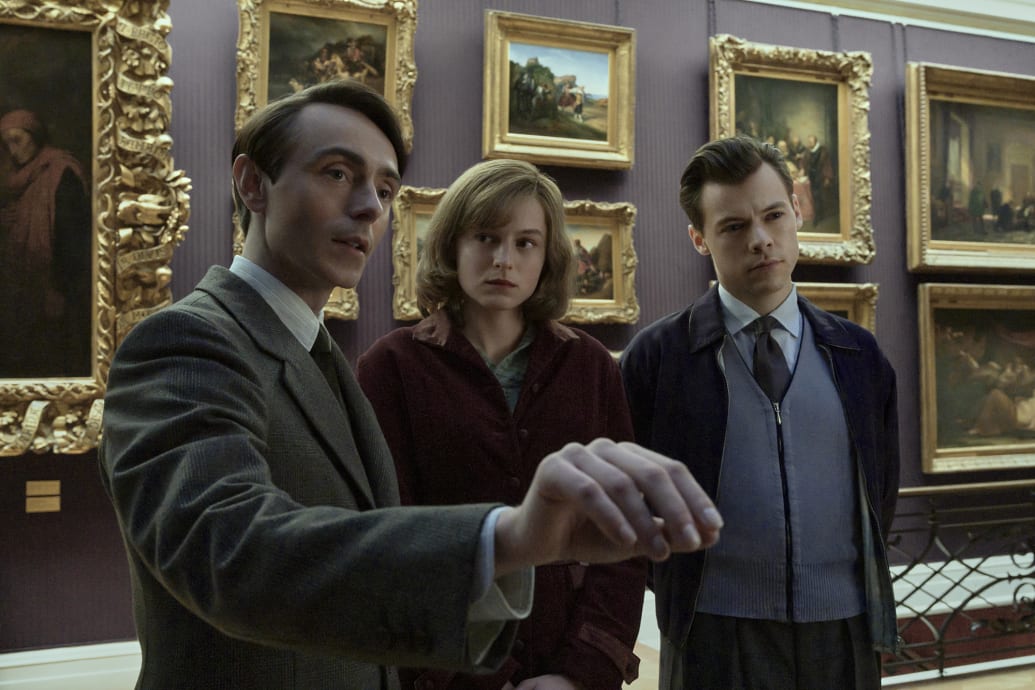
Amazon Studios
As they gallivant around the canals and cobblestone alleys of the city, stealing kisses and prolonged glances, I was reminded of how I had felt in past relationships, when I was younger and less knowledgeable about both love and sex, and the clear differences between the two that often blur in moments of our most carnal pleasure. I remembered loving in public and how it was equally terrifying and freeing, and was moved by how deftly Grandage manages to translate that feeling to this film.
I sat in my screening, ready to have my skepticism confirmed—as it so often is when actors, especially big names like Styles, try to portray the realities of gay sex onscreen. What bothered me the most about his comments on gay sex in film wasn’t just that they were wrong, but that his statement implied that gay sex exists as a binary: only rough fucking or tender and soft. Often, it’s a mix of both, a naturally flowing progression that moves with the moment. It’s a dance, made all the more special by the unspoken knowledge that it’s an inherently radical one, no matter what time period it takes place in.
In fact, I was reminded of the quiet affection in the center of Todd Hayne’s Carol, which I consider to be one of the greatest queer films of the century. That film was similarly directed by a gay man and starred straight actors. (Although I should note: I certainly don’t think it’s out of the realm of possibility that Styles, who declines to comment on his sexuality, is queer; Dawson is also part of the community.)
But Carol and My Policeman both understand that much of our longing and desire is done in silence. Small glances and brief grazes of hands say so much. My Policeman handles sex and intimacy with grace and anticipation, careful to show its characters both burdened and buoyed by the pulsing sensation that their deepest desires may be either rejected or reciprocated. The audience can practically feel Tom and Jack’s hearts pounding and minds racing, and their sex scenes are the film’s emotional high points.
That said, the film doesn’t always make much sense outside of these scenes. Tom never questions his steadfast commitment to the law and his profession, despite his own love being illegal. And the final resolution of Tom and Patrick’s relationship feels tied up far too quickly. The film’s focus on the physical intimacy between its leads as opposed to shading in its characters makes it feel completely stuck in another decade.
Ron Nyswaner’s script takes so much pride in being willing to depict these things that it forgets it has to do more to be memorable. Our stories aren’t so rare anymore, and we deserve more than good sex scenes. But for all its audience’s misgivings, My Policeman succeeds in making its most controversial elements genuinely beautiful. For someone, somewhere, that’s going to be very important.

